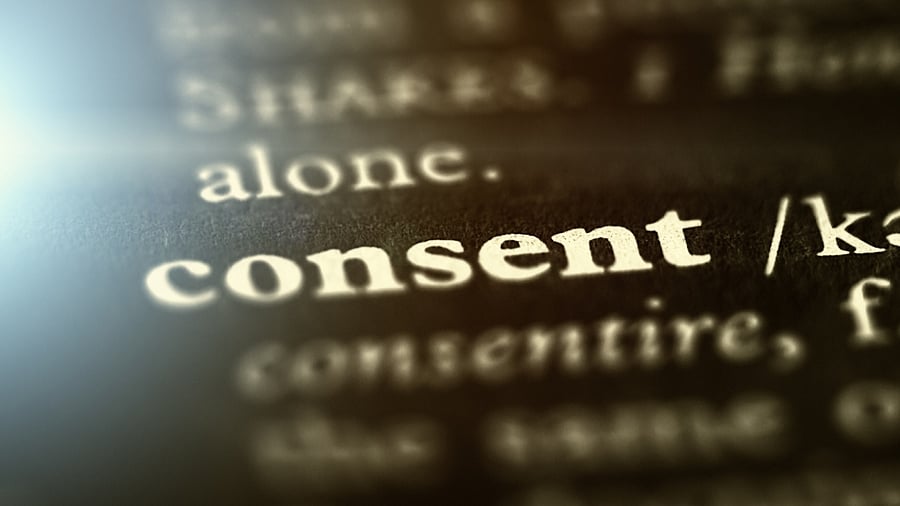
On July 10 an industrial tribunal in Delhi observed on a pending TERI case that “a man should know the difference between explicit consent of a woman and her explicit “no” or implied consent.” In the said case, despite the woman expressing her discomfort and disinterest, the man continued to send her messages.
Many of us do this in our attempt to ‘persuade’, ‘please’, ‘court’, or ‘woo’ the other person, not realising that as per India’s POSH Act, this could be ‘sexual harassment’ should they choose to report it. It is routed in the idea of ‘consent’, and what may be ‘unwelcome’ to the recipient. Such behaviour is also a criminal offense under Section 354A of the Indian Penal Code (IPC). Let’s look at some of the other legal interpretations of ‘consent’ that may impact us in our daily lives:
Consent under duress due to power dynamics: The court in the TERI case mentioned earlier said that repeated attempts to foster personal relationships with reporting employees is conflict of interest, and misuse of designation. If one consents to a sexual activity due to the power the other person holds and fear of detrimental treatment, intimidation, threat, etc., such consent is invalid in the eyes of law, and would still be considered as sexual harassment under Indian laws.
On a related note, the Indian Contract Act states that “two or more persons are said to consent when they agree upon the same thing in the same sense” and “free consent” is when it is not caused by coercion and undue influence. The IPC also defines consent as “the unequivocal voluntary agreement by a person to engage in the sexual activity.”
Consent in the online world: Emojis today have become our expressions. More than 5 billion emojis are used every day on Facebook. On July 6, a Canadian judge ruled that the ‘thumbs-up’ emoji is just as valid as a signature, and courts need to adapt to the ‘new reality’ of how people communicate. Several such decisions are being passed regularly. In 2018, the Madras High Court said that emojis can be offensive. To top it, cross-cultural understanding of different emojis make interpretations greyer. Further, use of certain emojis outright fall under the scanner of the Indian IT Act.
As ideas such as enthusiastic voluntary consent vs. subtle ‘no’ become difficult to interpret in the emoji world, it is important to practice mindfulness and duty of care when using and understanding such emojis in a conversation.
Consenting to being recorded vs. sharing of private pictures/videos publicly: The post-COVID-19 world is seeing the use of technology like it had never before. Resultantly, the use of social media and chatting apps have increased manifold. This has also resulted in increased sexting, morphing, deep fakes, threats, blackmails, cyberbullying, and more. As per data released in January by Statista Research Department, around 77 per cent of respondents aged 19 years and older have sent a sext, while around 88 per cent received one. Similarly, the proportion of deepfakes more than doubled — from 0.2 per cent to 2.6 per cent in the United States. This has impacted India and its workplaces as well, and a similar trend can be noticed.
Recording a woman engaged in a private act without her consent is a crime in India. Also, as per Indian laws, while a consensual act of making of nude videos or sexting may not be crime, violating privacy, circulating them without consent, leaking them online or blackmailing about the same is. This is commonly referred to as sextortion.
Consent to sex by a person under 18: The Indian law treats consensual sex with a woman under 18 as rape. Being a gender-neutral law, the provisions under the POCSO Act add to it. Several cases of consensual sexual acts get reported for prosecution currently. Hence, the meaning and interpretation of consent loses value when ‘age’ is under review, and while this is under debate currently, it is important to keep in mind that consensual sexual relationship with a person under 18 may be questioned until the laws have been amended.
Assumed consent due to marriage: As per the National Family Health Survey (2019-2021), 18 per cent of Indian women are unable to tell their husbands ‘no’ when they do not want to participate in sexual intercourse. On May 11, 2022, the Delhi High Court issued a split verdict – one judge saying it is violative of human rights, the other disagreeing. While whether marital rape is crime or not is waiting to be decided by the Supreme Court of India, we can use common sense and judgement to ensure that we respect the other individual should they lack desire to engage in a sexual activity.
Respecting another human being and their right to willingly, freely, and enthusiastically consent hardly requires legal backing in situations that involve intimate relationships. It requires us to be mindful to ensure we do not exercise force, undue power (whether physical or otherwise), misrepresent, or cheat a person to lead them to consent. TV host John Oliver’s quote on consent is an apt one: “Consent is like boxing. If both people do not agree, then one person is committing a crime.”
Shivangi Prasad is an anti-harassment and anti-discrimination lawyer.
Disclaimer: The views expressed above are the author's own. They do not necesarily reflect the views of DH.